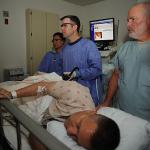Hardly a day passes without a report of some new, startling application of Artificial Intelligence.
colon cancer
Some scares never go away no matter whether there is a remotely plausible basis for the scare (maybe asbestos in talc) or pure insanity (vaccines causing autism).
We've officially gone full circle. There was a time when people feared that artificial sweeteners caused cancer. (They don't.) Now, researchers claim that artificial sweeteners prevent cancer. Do they?
Colon cancer kills more than 50,000 Americans each year. One in 22 men and one in 24 women will be diagnosed with colon cancer in their lifetime. Currently, patients rely on colonoscopies to detect pre-cancerous growths called polyps.
If it seems that we are constantly being bombarded with confusing and conflicting information about Vitam
The latest in health news: Vitamin B supplementation could help reduce first stroke in adults with hypertension, strength training for the elderly key to good health, and cancer survival rates improving across the board
For years, we ve been hearing about how the obesity epidemic will pose an ever-greater public health threat if we






